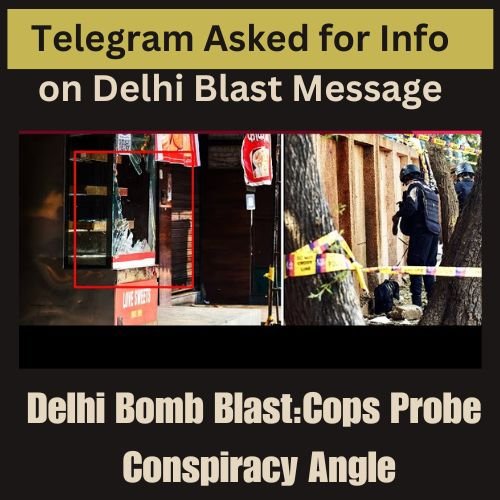Introduction
In a shocking turn of events, Delhi was rocked by an explosion that has everyone on edge. As investigators race to uncover the truth, messaging app Telegram is now front and center in the investigation. Authorities believe a crucial message sent on Telegram might be linked to the blast, and they’ve officially asked the platform to provide details that could help solve the case.
This incident has put both law enforcement and the public on high alert, and Telegram’s role in the investigation is raising eyebrows. Let’s dive into the details and explore how this messaging app has become an important part of a high-stakes investigation.

Details of the Explosion
The explosion that rattled Delhi occurred recently, leaving both residents and officials in a state of shock. While initial reports are still coming in, the blast took place in a busy area, causing chaos and concern among the public. Fortunately, reports indicate that casualties were minimal, but the damage is enough to keep people talking—and authorities working around the clock.
Investigators have been working swiftly to piece together the circumstances behind the blast. Early findings suggest that the explosion could have been caused by an improvised explosive device (IED), though this is yet to be confirmed. Police are relying on both physical and digital evidence to track down those responsible, and this is where Telegram steps in.
Telegram’s Role in the Investigation
Telegram is a popular messaging app known for its privacy features and end-to-end encryption. With millions of users worldwide, it’s a go-to platform for anyone looking to send secure messages. But sometimes, this security can complicate things, especially when it comes to investigations. In this case, it seems a message linked to the Delhi blast was sent via Telegram, sparking interest from law enforcement.
Authorities believe this message could hold vital clues about who is behind the explosion. As a result, Telegram has been asked to furnish details on the specific message in question. This isn’t the first time law enforcement has turned to encrypted messaging apps for help, but it does highlight the growing challenge of balancing user privacy with public safety.
Security Concerns and Digital Evidence
In today’s world, digital evidence plays a massive role in criminal investigations. From social media posts to encrypted messages, every byte of information can be a potential lead. In the case of the Delhi blast, investigators are diving deep into digital platforms to uncover any messages, conversations, or content that might help identify those involved.
Telegram, with its reputation for privacy, presents a challenge. While the platform offers a safe space for its users, its encryption features can sometimes make it difficult for law enforcement to access key information in time. That’s why this request for details is so important—if Telegram cooperates, it could offer crucial insights that lead to the capture of those responsible for the blast.
Legal and Privacy Implications
With Telegram being asked to share user data, the legal and privacy implications come into play. On one hand, authorities need the information to ensure public safety, but on the other, Telegram has built its brand on offering users a high level of privacy and protection. This tug-of-war between law enforcement and privacy advocates has sparked a debate.
Messaging apps like Telegram and WhatsApp have always faced scrutiny when it comes to sharing data with government bodies. While many countries have laws allowing for such information requests in criminal cases, privacy remains a hot-button issue. Telegram will need to walk a fine line between cooperating with the investigation and maintaining the trust of its user base.
Government and Law Enforcement Actions
The Delhi police and other security agencies aren’t taking this case lightly. As soon as they suspected a Telegram message could be involved, they launched a full-scale cyber investigation, aiming to trace the origins of the message and who may have sent or received it. Every lead is being pursued, with multiple teams working together to track down any potential suspects.
For Telegram, this means the clock is ticking. Authorities have made an official request for the app to provide relevant data, including the message’s sender, recipient, and other details that could help them connect the dots. The sooner Telegram cooperates, the faster law enforcement can move forward with the investigation.
Impact on Messaging Platforms
This latest incident is sure to reignite conversations around the role of messaging apps in crime and security. As platforms like Telegram, WhatsApp, and Signal continue to gain popularity, their use in criminal activities also grows. With their powerful encryption, these apps are incredibly secure, but that same security can sometimes protect those with harmful intentions.
The Delhi blast investigation might push for more regulation on how these platforms handle data requests in criminal cases. Governments and tech companies have been grappling with the balance between privacy and safety for years now, but high-profile incidents like this could spur new policies, especially in countries like India, where security concerns are paramount.
Public and Media Reactions
Unsurprisingly, the news of Telegram’s involvement has sparked a flurry of reactions, both in the media and among the public. Some are praising the authorities for acting swiftly and using all available resources to track down those responsible for the blast. Others, however, are voicing concerns about the potential overreach into private communications.
On social media, opinions are divided. Some users are calling for Telegram to cooperate fully, while others are worried about the implications this could have for user privacy in the future. As Telegram users eagerly await an official response from the company, it’s clear that this case has ignited a larger conversation about the role of secure messaging in today’s world.
What Could the Future Look Like?
With the ongoing investigation into the Delhi blast, the outcome of this situation could have lasting effects on the way encrypted messaging platforms are used and regulated. Should Telegram decide to cooperate with authorities, it may set a precedent for future cases, making it easier for law enforcement to access critical data in times of need. This could lead to further changes in how these platforms balance privacy and public safety.
On the flip side, if Telegram refuses to comply, it could spark a larger debate on the rights of users to communicate securely without fear of their data being shared. Either way, the case is bound to shape conversations about the future of messaging apps and their role in preventing and solving crimes.
Wrapping Up: A New Era for Messaging Apps?
As the investigation into the Delhi blast unfolds, all eyes are on Telegram to see how the platform responds to the authorities’ request. Will the app hand over the details necessary to move the case forward, or will it stick to its guns and prioritize user privacy above all else? Whatever the outcome, this situation is bound to set the stage for future discussions on digital privacy, law enforcement, and the fine line between the two.
In an age where so much of our communication happens online, cases like this highlight just how intertwined technology and security have become. As we wait for updates on both the investigation and Telegram’s response, one thing is clear—the rules of the game are changing, and it’s going to be fascinating to see how this plays out!
